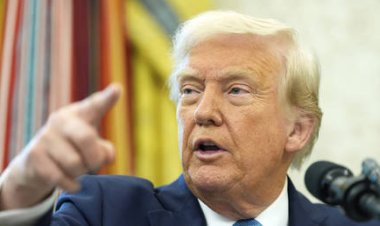Is Michael Bennet Redirecting His Battle Against Trump to the State House?
The senator from Colorado, who has been brought up to respect the esteemed deliberative processes of the nation, appears to be on the verge of abandoning hopes for Washington.

Appointed to fill a vacancy in 2009, this was the same period when Colorado was solidifying its Democratic leanings. As the son of the former staff director of the Senate Budget Committee and the grandson of another political figure, Bennet entered the Senate with a distinguished lineage, a notable background, and, most importantly, a thoughtful, friendly, and moderate approach that resonated in a chamber that once valued these traits.
However, after 16 years in office and as he approaches his 60th birthday, Bennet is contemplating leaving behind the seniority, the Senate, and Washington, the city where he grew up.
He expresses frustration not only with Congress but also with Joe Biden's perceived self-interest, Donald Trump’s impact on both political parties, and the damaging effects of social media on politics and the notion of shared facts.
Multiple sources within the Democratic circles in Washington and Denver indicate that Bennet is likely to run for governor in Colorado next year.
In an hour-long interview, Bennet revealed little about his immediate plans but hinted at an announcement in early April.
“The central fight is whether or not we can create an economy where people feel like when they work hard they get ahead,” he stated. “And I think the answer to that over the next decade is as likely to come from the states as it is from Washington.”
Reflecting on his father’s career — a tenure that included working for prominent Cold War senators and leading USAID — Bennet expressed a desire for his father's counsel.
“I wish he were still alive, because I wish I could ask him his advice,” Bennet said. “And I think what he would tell me is, notwithstanding the fact that he worked here and he loved this place, he also moved on to do other things. And he might say, take what you've learned and find a place to be as effective as you can be.”
Bennet’s uncertainty about whether the Senate remains a venue for effectiveness is a striking critique of what has been referred to as the world’s greatest deliberative body.
He is not alone among lawmakers considering other paths. In fact, several Democratic senators, including Gary Peters, Tina Smith, and Jeanne Shaheen, have already announced they will not seek re-election this year.
Some of these decisions stem from reaching retirement age or a reluctance to endure a protracted period in the minority. Collectively, alongside numerous legislators from both parties who have departed since Trump's initial election, it's clear that the Senate, once a prestigious political platform, has lost some of its allure.
Historically, governors viewed the Senate as an advancement, even if they often preferred the executive office back home. Bennet’s colleague and former boss, Senator John Hickenlooper, exemplifies this trajectory. While critical matters regarding war, treaties, and the Supreme Court were addressed in the nation's capital, state-level issues like education and infrastructure were managed locally.
What makes Bennet's frustrations especially significant is their depth, transcending the usual complaints. He is frustrated by the concentration of power and the reduction of the roles of Senate committee leaders he once knew.
“The duties of the senators have been sucked up basically into the leadership of the Senate,” he remarked, adding that “the decision-making among the four corners in the Congress has in some sense dispossessed the other actors.”
While he sidestepped inquiries regarding Senate Democratic leader Chuck Schumer's leadership, he was forthright about the apparent lack of direction.
“I think we need a strategy, and I think we need a plan, and we need a message,” he stated, noting: “And if current leadership can't figure out how to do that, then the caucus will figure out how to do that.”
Is the prevailing message solely that Trump is bad?
“I think the current message is basically, yeah, Trump's bad.”
Bennet's evident dissatisfaction with serving in a Trump-centric Washington highlights a broader issue. The departures of anti-Trump Republicans have been documented extensively, yet Trump has also rendered Congress less attractive for serious-minded Democrats looking to legislate amidst a GOP that seems fragmented or beholden to a personality cult.
“That has been a big change, that’s a big difference,” Bennet observed, pointing to the exits of figures like John McCain and Jeff Flake. “There are people here, but it's also true across the country, for whom Trump's approach to politics has become normalized.”
More explicitly, he added: “I’d be lying, if I said — It’s tough when you got everybody on the other side voting for Pete Hegseth to be the secretary of defense.”
In essence, there will be limited opportunity for robust debate over issues like the Child Tax Credit, which is a priority for Bennet, when daily discourse revolves around Trump's actions or statements.
He calls this dynamic “shirts and skins” tribalism, and he detests the prevailing culture. Nonetheless, it is important to note that Bennet is eager to engage in the ongoing battle against Trumpism.
Though he is conscious of his mortality, possibly shaped by his father’s death at 79 and his own battle with prostate cancer, he remains determined.
During our conversation, it struck me that Bennet’s potential early exit from the Senate, along with his brother's troubled tenure at The New York Times, shared a tragic resonance. Here were exceptionally talented siblings who might have thrived in an earlier, more cooperative political climate.
“I don't feel like I was born too late,” Bennet declared, emphasizing his commitment to his policy objectives in the realms of economy, healthcare, education, and preserving the American dream. “I think that my expectations about where we would be and the progress that we have made turn out not to have been fulfilled. And I am becoming incredibly impatient with the notion that I could die before seeing this to-do list addressed.”
His impatience has grown since Trump's second election, a jarring event for him.
“It definitely did,” he admitted, “it definitely did.”
This reflects his profound dissatisfaction with his own party.
Bennet has long voiced concerns about Washington — even publishing a 2019 book critical of “the pathological culture of the capital” — but Trump’s resurgence represented a pivotal moment for him.
“I can't say that I was surprised, but I find it shocking that the Democratic Party lost to Donald Trump twice, once after he took away a woman’s right to choose, you know, and with all of the convictions and everything else,” he remarked. “And you know what? I hate to say this, there are many things that I blame Donald Trump for but getting elected is not one of them.”
He attributes that failure to Biden. While Bennet's own presidential run in 2020 was largely unremarkable, he recognized that Biden might have been the only Democrat capable of defeating Trump that year.
Yet Bennet was one of the first Senate Democrats to publicly declare that Biden’s chances of winning the election plummeted after a disastrous debate. He has also been a vocal critic of Biden’s decision to pardon his son, Hunter, upon leaving office.
His frustration remains palpable.
“What I would say to the American people who are frustrated that the Democratic Party has not fought hard enough to provide a compelling alternative to Donald Trump, a big piece of that was the decision that Joe Biden made to run for re-election,” Bennet stated.
“The Democratic Party,” he added, “didn't show up as a fighting force during the Biden administration.”
However, he admitted that he never privately advised Biden or his aides against seeking re-election. “I wish I had,” he conceded. “I wish we all had.”
Bennet recalled a caucus meeting following the infamous debate, where he warned colleagues that “if we elect Donald Trump president, we will be the first generation of Americans to leave less opportunity, not more, for the people coming after us.”
This concern deeply troubles Bennet. It's not merely Biden's self-absorption or the party's failure to intervene sooner, but the broader missteps of Democrats and their implications.
Although Bennet is more centrist than his party's progressive wing, he recognizes the expanded policy possibilities of this era and criticizes Democrats' lack of boldness from both the left and the right.
“When I think about this last election, was it important for us to make sure that we were extending the Obamacare tax credits for healthcare?” he questioned. “Of course it was. But shouldn't we be standing for universal healthcare in this country? Shouldn't we be standing for universal mental healthcare, especially for our kids who have been so incredibly affected by Covid and by social media?”
In education, an area where he has significant expertise, Bennet believes his party must be more ambitious.
“We have to recognize that our system of public education has to be dragged from the 19th century to the 21st century, what are our ideas for that?” he said, expressing exasperation that much of the Democratic narrative on education revolves solely around “forgiving student loan debt.”
Yet the issues extend beyond just the upcoming election cycle.
“The Democratic Party failed to make a compelling case in really a generation worth of elections,” Bennet argued.
He acknowledges, however, that the pressing challenges of today are more structural than tactical.
Though he doesn't yearn for the past — “I don’t mourn the analog world,” Bennet stated — he noted that “our tribal instincts have been concretized by the medium of the internet.” He asserted that digital technologies must address this issue to enable Americans to “have a shared understanding of the facts.”
Perhaps influenced by his brother’s experience, or perhaps out of a love for literature, Bennet frequently returned to the destructive consequences of social media and its algorithms, which have fueled division and undermined the notion that people are entitled to their opinions but not their own facts.
“We have had many reactionary periods in American history,” he reflected. “Those have always been followed by a progressive period. Always, always. The only difference right now, between our lives and those lives, is we destroyed our journalism in America.”
The “old political order has collapsed,” Bennet remarked, and “the journalistic order has collapsed with it.”
Yet, he underscored, his passion for building what comes next remains strong.
“Whatever I do is not going to signify a retreat from anything,” Bennet declared. “What I'm trying to figure out is where the fight can best be joined.”
The golden dome of Denver awaits.
Ian Smith for TROIB News












